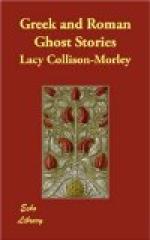This story, like nearly every other that we have come across, has a parallel in the Philopseudus. Indeed, Lucian seems to have covered almost the whole field of the marvellous, as understood at that time, in his determination to turn it into ridicule in that amusing dialogue. In this case we are told of a little statue of AEsculapius, which stood in the house of the narrator of the story, and at the feet of which a number of pence had been placed as offerings, while other coins, some of them silver, were fastened to the thighs with wax. There were also silver plates which had been vowed or offered by those who had been cured of fever by the god. The offerings and tablets are just such as might be found in a Catholic church in the South of Europe to-day; but the coins, in our more practical modern world, would have found their way into the coffers of the church. One would like to know what was the ultimate destination of these particular coins—whether they were to be sent as contributions to one of the temples of AEsculapius, which were the centre of the medical world at this period, and had elaborate hospitals attached to them, about which we learn so much from Aristides.
In this case they were merely a source of temptation to an unfortunate Libyan groom, who stole them one night, intending to make his escape. But he had not studied the habits of the statue, which, we are told, habitually got down from its pedestal every night; and in this case such was the power of the god that he kept the man wandering about all night, unable to leave the court, where he was found with the money in the morning, and soundly flogged. The god, however, considered that he had been let off much too easily; and he was mysteriously flogged every night, as the weals upon him showed, till he ultimately died of the punishment.
AElian[110] has a charming story of Philemon, the comic poet. He was still, apparently, in the full vigour of his powers when he had a vision of nine maidens leaving his house in the Piraeus and bidding him farewell. When he awoke, he told his slave the story, and set to work to finish a play with which he was then busy. After completing it to his satisfaction, he wrapped himself in his cloak and lay down upon his bed. His slave came in, and, thinking he was asleep, went to wake him, when he found that he was dead. AElian challenges the unbelieving Epicureans to deny that the nine maidens were the nine Muses, leaving a house which was so soon to be polluted by death.
Many stories naturally gather round the great struggle for the final mastery of the Roman world which ended in the overthrow of the Republic. Shakespeare has made us familiar with the fate of the poet Cinna, who was actually mistaken for one of the conspirators against Caesar and murdered by the crowd. He dreamt, on the night before he met his death, that Caesar invited him to supper, and when he refused the invitation, took him by the hand and forced him down into a deep, dark abyss, which he entered with the utmost horror.




